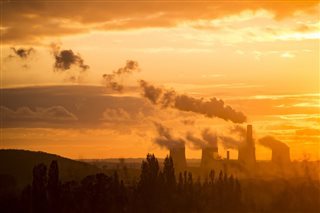Tracking the consumption of your business's carbon footprint or natural capital resource use may be something that will be useful to your business in the future. In the meantime, perhaps you're wondering whether there's a need to track additional costs related to the national implementation of the carbon tax in Canada.
The Government of Canada has developed a federal carbon pollution pricing system as part of its plan to implement a federal greenhouse gas emissions pricing structure.
The national carbon-pricing plan, is in place now to :
"Encourage Canadians and big business to use less fossil fuels." - Globeandmail.com
Under the federal levy, oil products such as gasoline and diesel, natural gas and coal-fired electricity are affected. See this video for details on what the Carbon Tax is. Basically though, a carbon tax gets green solutions into use.
"A carbon fee puts a monetary price on the real costs imposed on our economy, our communities and our planet by greenhouse gas emissions and the global warming they cause. A shift by households, businesses and industry to cleaner technologies increases the demand for energy-efficient products and helps spur innovation and investment in green solutions." - The David Suzuki Foundation
How can tracking carbon data be useful to you?
For a breakdown listing of fuel charge rates in provinces and territories in Canada see this resource.
At some point in the future, every business will be able to monetize and or reuse their carbon emissions through technologies such as the air capture techniques being developed by companies like Opus12. This is a thing! Watch the video.
In the next weeks, we'll try to go further down the rabbit hole of answering such questions such as should small business track what they're spending on this additional carbon tax charge per year? And how? Most of the information we've come across so far in our research gives a high level overview of costs per tonne of emissions of C02. The cost of the carbon tax is built into the charge at the gasoline station, making it difficult to separate out and track.
Could this data and other data on emissions or use of eco-services be of use however to fast track the decarbonization of our society? 
What does the national carbon-pricing plan look like so far in Canada?
Depending on where you live / do business and or whether there is an existing carbon tax in your province, the Ottawa imposed federal tax may now apply to you (in Ontario, Saskatchewan, Manitoba and New Brunswick) as of April 1, 2019.
Canadians elsewhere will be covered by provincial plans, either a direct tax or cap-and-trade system, and those governments must determine what to do with the revenue.
Stay tuned for possible changes after the 2019 election but for how, here's an overview of carbon tax implementation across Canada as of July 2019:
Province or Territory |
Is affected by Carbon tax?
|
Other Details |
|
Alberta |
Alberta has had carbon pricing in some form since 2007. Farmers and low income families (with less than 37k) per yr are exempt. The original carbon levy was repealed effective May 30, 2019. Bill 1, An Act to Repeal the Carbon Tax, received Royal Assent on June 4, 2019. Stay tuned for more info. |
|
|
British Columbia |
In 2008, the province implemented North America’s first broad-based carbon tax, proving that it is possible to reduce emissions while growing the economy.
"Beginning April 1, 2018, B.C.'s carbon tax rate is $35 per tonne of carbon dioxide equivalent emissions. The tax rate will increase each year by $5 per tonne until it reaches $50 per tonne in 2021." - gov.bc.ca |
|
|
Manitoba |
Ottawa imposed federal tax may now applies as of Apr 1, 2019. Their new carbon dioxide reductions target is set at 1 megatonne, down from 2½-megatonnes target announced in 2017. |
|
|
New Brunswick |
Ottawa imposed federal tax may now applies as of Apr 1, 2019. The legislation will allow the federal 4.42 cent per litre tax on gasoline, 5.37 cent per litre tax on diesel and heating oil and 3.1 cent per litre tax on propane to pass through to consumers. |
|
|
Newfoundland and Labrador |
Has a provincial plan for carbon pricing. The tax plan will be rather lax for the average consumer — the temporary four-cent gas tax will be repealed, and replaced with a 4.42-cent carbon tax. |
|
|
Nova Scotia |
Nova Scotians will pay slightly more for gasoline, electricity, natural gas and heating oil over the next four years as a result of the province's new cap-and-trade system. The program will add about 1 cent per litre to the price of gas, compared with about 11 cents per litre by 2022 under the federal approach. |
|
|
Ontario |
Ottawa imposed federal tax may now applies as of Apr 1, 2019. |
|
|
Prince Edward Island |
A 4.4 cent per litre carbon levy on gasoline kicked in April 1, 2019, negating a 3.4 cent tax decrease implemented by the P.E.I. government at the start of the year |
|
|
Québec |
Quebec became the first province in Canada to introduce a carbon tax. In addition to this, Quebec’s cap-and-trade system came into effect in 2013. Quebec quietly passed the $3-billion mark in total revenues from its own approach to pricing pollution. |
|
|
Saskatchewan |
Ottawa imposed federal tax may now applies as of Apr 1, 2019. In 2019 the fuel charge on gasoline will be 4.42 cents per litre in 2019 and the fuel charge for natural gas used in home heating will be 3.91 cents per cubic metre – these rates will increase over time.
|
|
|
Northwest Territories |
NWT has a carbon tax on fuels effective September 1, 2019 based on $20/tonne of GHG emissions. This would increase annually to $50/tonne. Excluding aviation fuel from carbon pricing. Rebating 100% of the carbon tax for heating fuel for most residents, businesses, and governments. |
|
|
Nunavut |
The federal carbon tax came into effect in Nunavut on July 1, 2019. |
|
|
Yukon |
The federal carbon tax came into effect in the Yukon on July 1, 2019. The federal government is expected to collect $7.8 million in revenue from the Yukon in the first year of the tax. |
What industries / jobs are exempt from the Carbon Tax?
If you are a Farmer, Greenhouse Operator, or Fisher, and you carry out eligible activities as defined within the meaning of the Greenhouse Gas Pollution Pricing Act (the Act), then you can fill out a Fuel Charge Exemption Certificate. See below for links to the English language forms:
- Fuel Charge Exemption Form – FARMERS
- Fuel Charge Exemption Form – GREENHOUSE OPERATORS
- Fuel Charge Exemption Form – FISHERS
The notes on what to do next involve providing the certificate to your supplier of fuel, and keeping a copy of the certificate for your records. CRA does not need a copy.
Additional Resources:
- Canada.ca - Carbon pollution pricing – what you need to know
- 10 Myths about Carbon Pricing in Canada by Canada's Ecofiscal Commission
Thanks for reading!
For more resources visit: Sage Product Support Resources for help with products in North America






